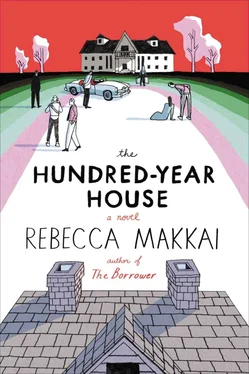“And did she hang herself?”
Mrs. Carmichael put down her silver polish and looked puzzled. “It’s funny. I don’t know why, but I always assumed she jumped.”
Grace watched George take the Darrin out of the garage. Max waved after him, and George backed out toward the big house, then took off like a French racer through the gate. When he drove like that, when he took the Darrin, it was a sure sign he wouldn’t be home the same day. Maybe he was headed to Chicago. To a whorehouse. She wondered what it would be like to start life over as a whore, to show up on the step of a house of ill repute , to live there entertaining the men, the handsome ones only, until, one day, George would stumble in. And either recognize her, or not.
Max closed the garage door and disappeared inside, and then there was absolutely no one left in the world but Grace. She wasn’t serious about it in the slightest, but before she closed this last window for the winter, she wanted to see what it felt like, if it was even possible. She stepped out of her slippers and up onto the sill, bracing her feet against the outer edges, clinging with both hands to the bottom of the glass. She had to crouch to fit inside the small, open square, and the wind rushed straight through her dressing gown. It didn’t look far enough, really. You’d land on the grass, if you didn’t hit the pine tree on your way down. You’d at least end up in a wheelchair, but you might or might not die, and someone wanting to do herself in would undoubtedly choose something more certain. Maybe she’d poisoned herself, after all.
Below, Max came out of the coach house, out the mechanical room door right next to the stone wall. It wasn’t his usual way out, and there was something odd about the way he walked too: slowly at first, as if he were scoping things out, then very quickly, all the way along the wall to the gate. He had a leather satchel over his shoulder.
Perhaps this was the third strange thing, the one she’d been waiting for after the rabbits and the witch.
She ought to follow him. It was better than hanging out a window, and better than sitting here waiting for some five-act drama to unfold right on the lawn. She hopped inside and dressed quickly and retrieved her bicycle from the tree it had been leaning against, untouched, since July. She assumed Max must have walked toward town, and she was right: After a few blocks she saw him hurrying along the opposite sidewalk. He turned left, toward the college, and she hung back and followed as obliquely as possible.
He walked past the main gates, across a quadrangle, and through the side door of a Gothic building. Grace parked at a stand of student bikes and walked toward the same door, trying to look purposeful and collegiate. Inside, students milled and sat on hallway benches, and in all directions the classrooms were filling. The signs on the bulletin boards seemed history related. Max had vanished. She peeked tentatively through an open door, then another, and finally she spied the back of his head in a lecture hall. He took a notebook from his satchel, just as his neighbors were doing, and set it on the table in front of him. He turned and whispered something to the thin-shouldered blond boy on his right. A few more students brushed past Grace, and finally a professor strode to the front, with a ripped shopping bag instead of a briefcase.
“Have we spent every waking moment reading about the Bolsheviks?” he asked, and a laughing groan rose from the room. “Fantastic.”
She shouldn’t hang around, even though she might have liked to audit a class herself. An art class, perhaps. She’d adore a good course on the Dutch masters. She knew what would happen, though. George would find out, and then one day he’d storm in and drag her out of the class by the arm. And she couldn’t abide the looks, the gawking undergraduates, and she’d never be able to return. So that was the end of that particular fantasy. She walked out of the building, smiling at the students: the girls in their sweater sets, the boys leaning and smoking and glancing with curiosity at Grace.
Back through town. She aimed her bicycle wheels at individual dead leaves, loving the crunch. She didn’t particularly want to go home just yet. There was a beauty parlor with a bicycle stand in front, Matilda’s House of Style, and she might as well follow her impulse inside. She had put ten dollars in her pocket, and this would at least be a place to sit down. The cycling had tired her quite a bit.
The woman at the desk told her there was a spot open in twenty minutes, and asked her name. “Amy Hall,” Grace said. And she smiled and tucked her hair behind her ears, and sat to read a copy of Vogue .
When they called Amy, she was ready — she’d prepared herself to respond to the name — and she had a shampoo and then sat in the chair while Matilda cleaned her scissors.
“I want it just below the ears,” she said. “I need a new look.” Matilda began combing, and told her she had lovely hair, just like Grace Kelly. “Oh, you’re too sweet.” She was trying out just a bit of southern accent, not a harsh one like Amy’s but a refined version. “You know, I’ve just moved here from Florida. My husband Max and I. I thought I’d like a new cut to go with the new house.”
“Oh, congratulations!”
“It’s just a little one. You know, a starter home. It used to be the coach house of an old estate, but they’ve converted it. I’ll tell you, though, I’m not used to this cold. And to think, it’s only October! I don’t know what I’ll do with myself this winter.”
“Long underwear!” Matilda said. “That’s my advice.” She raked Grace’s hair out in a straight line and chopped an inch from the end. “And maybe you’ll start a family. Some meat on the bones will keep you warm.”
To her surprise, Grace actually blushed. She’d sooner give herself a lobotomy than have a baby with George right now, but the newlywed Amy and her husband Max might indeed love to have a daughter, a little girl with soft cheeks and smocked dresses. She marveled at how readily she could feel the emotions of this invented self.
—
She was on her way through the front door when she saw rabbits. Just three this time, moving quickly along the front of the house. Not so much fleeing her footsteps as running toward a secret party. Grace wondered why on earth God or nature would put that puff of white on their rear ends, when everything else about the rabbit seemed designed for maximum camouflage. Their silence, their speed, their fur like dried grass. But then, at the back, this white target, this flash of light. And they’d never know, would they? Had any rabbit ever seen its own backside, seen the way it was trailed by its own demise?
She followed them around the house.
Outside the solarium, Ludo had marked the lines for the greenhouse with little flags. He’d made arrangements for a crew to come dig out the foundation before the ground got hard. He’d ordered the glass and cement, too, and was working with a friend who’d built greenhouses up and down the North Shore.
She couldn’t see where the rabbits had gone. The ivy on the house had shrunk back a bit for fall, as slowly as a balding man’s hair. Beneath, the bricks showed through. She found their regularity troubling, their strict overlapping. Something about the lockstep rigidity sickened her, and she thought she’d rather have the tangles of ivy back.
Back inside, she walked through the living room — she wasn’t at all sure what to do with it, but maybe paint it over in coral — and the dining room, which, when empty, was so overwhelmed by her grandmother’s portrait as to seem a shrine. Violet always looked a little surprised, as if Grace had caught her in the middle of some wildly inappropriate thought and she’d just managed to compose herself.
Читать дальше












